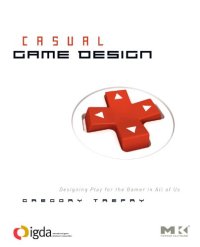
Ebook: Casual Game Design: Designing Play for the Gamer in ALL of Us
Author: Gregory Trefry
- Genre: Computers // Programming: Games
- Tags: Библиотека, Компьютерная литература, Разработка игр
- Year: 2010
- Publisher: Morgan Kaufmann
- Edition: 1
- Language: English
- pdf
When I saw this book I wondered how someone could write a whole book on casual game design. I mean, we all play games--we know how games work. Beyond that, don't you just need a moment of creativity and then you put it together and you have a new game? You can't learn to be creative by reading a book, right? So out of sheer curiosity, I got the book.
Turns out, it was an interesting read... well, at least the first 1/2. Not that the 2nd 1/2 was bad--don't get me wrong, but the most interesting stuff was at the beginning. The last sections seemed to get a little bogged down going through all sorts of examples of actual games which, I'm sure I would have appreciated more if I was actually trying to develop a new game and not just reading about game development from an academic standpoint. Throughout the book, the author talks about why we play games, what we like about them, and what sorts of things turn us on or off toward playing a certain game. Not only does this apply to the actual mechanics of the game itself, but he also teaches us what sorts of things to avoid in things like the written rules and other aspects of the game.
I'll be honest, I didn't realize there was so much to games. As the author points out, we tend to take most games for granted--they have been around for so long, it's hard to imagine life without them. An example he gives is tag. Tag is a game that every child seems to know, and yet it has a set of rules and these rules are dynamic and changeable within the constraints of the group playing it (which is how we get house rules).
I think this book is best suited for the budding game developer who likes to make up games as a hobby. I'm inclined to think that a professional game developer will probably already know a lot of the material in the book... but maybe he/she will have something to gain from it, I don't know--that's not my field. For the rest of the population, this is a great book to get from a library (if you can find it) but once you've read it, I doubt you'll want to come back and read it again. Still, it is an interesting journey into your own mind to see how you think and what you consider fun--something you already know but only subconsciously.
Turns out, it was an interesting read... well, at least the first 1/2. Not that the 2nd 1/2 was bad--don't get me wrong, but the most interesting stuff was at the beginning. The last sections seemed to get a little bogged down going through all sorts of examples of actual games which, I'm sure I would have appreciated more if I was actually trying to develop a new game and not just reading about game development from an academic standpoint. Throughout the book, the author talks about why we play games, what we like about them, and what sorts of things turn us on or off toward playing a certain game. Not only does this apply to the actual mechanics of the game itself, but he also teaches us what sorts of things to avoid in things like the written rules and other aspects of the game.
I'll be honest, I didn't realize there was so much to games. As the author points out, we tend to take most games for granted--they have been around for so long, it's hard to imagine life without them. An example he gives is tag. Tag is a game that every child seems to know, and yet it has a set of rules and these rules are dynamic and changeable within the constraints of the group playing it (which is how we get house rules).
I think this book is best suited for the budding game developer who likes to make up games as a hobby. I'm inclined to think that a professional game developer will probably already know a lot of the material in the book... but maybe he/she will have something to gain from it, I don't know--that's not my field. For the rest of the population, this is a great book to get from a library (if you can find it) but once you've read it, I doubt you'll want to come back and read it again. Still, it is an interesting journey into your own mind to see how you think and what you consider fun--something you already know but only subconsciously.
Download the book Casual Game Design: Designing Play for the Gamer in ALL of Us for free or read online
Continue reading on any device:

Last viewed books
Related books
{related-news}
Comments (0)